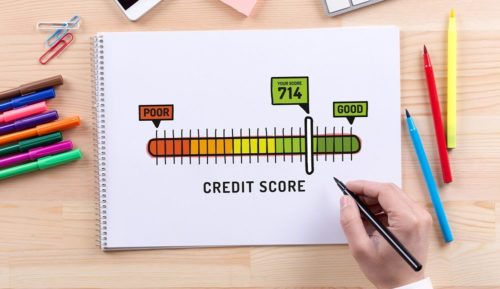
Your credit score is one of the most important numbers that represents you. It influences everything from the interest rate on your credit card to the kind of home you can afford and even the ability to rent an apartment. But have you ever wondered where it comes from?
Generally speaking, a credit score is an estimation of your likelihood to pay back debt. It’s valuable because it shows entities that might do business with you – like landlords or anybody lending you money – whether doing so will be safe or risky. Credit scores take into account many different factors, including how much you earn, how much you already owe, and how on top of your bills you are. But where does that information come from? And is it a true, accurate representation of your financial habits? Read on while we break down who is involved.
Table of Contents
Credit Reporting Agencies
There are three major credit reporting agencies whose job it is to collect financial data about you: Equifax, Experian, and TransUnion. How do they get their information? Banks, credit card companies, healthcare providers, retailers, and lenders all report information about your activity with them to these organizations. This data is then analyzed and turned into a credit score, which is a number that stands for your predicted creditworthiness.
Problem is, inaccuracies in credit reporting are all too common. Faulty data can result in an artificially low score, which can hurt your chances of qualifying for loans even if you’re a responsible borrower. Up until now, it has been up to consumers to check for inaccuracies in their credit reports, but many aren’t even aware that inaccuracies can occur.
This is beginning to change. On July 1, 2017, the Consumer Financial Protection Bureau (CFPB) published new standards that aim to increase fairness in credit reporting and decrease inaccuracies. The agencies and credit scoring models (which we’ll address in the next section) are responding by examining their reporting methods and improving their analytic processes. It’s also important to know that you can still dispute inaccuracies on your credit report. We’ve provided letter templates to help get you started.
FICO
There are two different models that analyze financial data to create credit scores: Fair Isaac Corp (FICO) and VantageScore. Historically, Equifax, Experian, and TransUnion have all reported their data to third-party company FICO to produce your credit score. Prospective creditors (a mortgage lender considering giving you a loan, for instance) can purchase this score from FICO and use it as a tool to decide whether it’s wise to extend credit to you based on what you’ve done with credit in the past.
FICO uses a complex set of metrics to estimate your typical credit behavior and calculate your score. On July 1, 2017, FICO changed its scoring model in response to new guidelines required by the Consumer Financial Protection Bureau (CFPB) that aim to increase fairness in credit reporting. This is a big deal because it means that certain types of behaviors are now scored differently than before, so credit repair strategies that worked in the past must now be reconsidered. On the flip side, some factors that might have hurt your score under the old model, like outstanding medical debt, hold less weight now.
Vantagescore
There is another type of credit score from a company called VantageScore, a newer player in the credit reporting game. Like FICO, VantageScore analyzes consumer data to produce a usable score, and must adhere to CFPB standards. But while FICO is a third-party company, VantageScore is actually a collaboration between the three credit bureaus.
VantageScore was founded with multiple goals. It takes many cues from FICO, but aims to provide a more modern, predictive model – in other words, one that more realistically forecasts how a borrower will behave. Conveniently, it also gives the credit bureaus a way to package their information into credit scores without having to contract out to a separate company.
The two credit score companies are only just beginning to score by the new CFPB requirements, and nobody – not even FICO or VantageScore – knows for sure how these guidelines will affect credit scoring, and how the new models will affect individuals’ scores. Ultimately, having two competing credit scoring entities will benefit both borrowers and lenders, as both will try to offer the best, most useful product possible. Both are investing heavily in revamping their models to be more accurate and useful.
You
It may feel overwhelming to think of big, faceless companies deciding your financial future. But at the root of it all, the data that goes into creating the credit score comes from you and your financial decisions. There are some expenses that can’t be helped, and carrying debt is often unavoidable. But you can control how you respond to these situations, and learn how to improve your credit even while carrying debt. Credit repair measures can also help you pay off debt more quickly and accrue it more slowly, so it’s a win-win.
Even simpler than cleaning up your financial habits (and less painful than belt tightening) is going over your credit report to check for mistakes. A low credit score might just be the result of inaccuracies in reporting, so it’s worth your time to root out these mistakes and go through the process to get them amended or excluded.
When it comes to finances, education is the name of the game. Knowing your credit score and how it’s calculated is an important first step. With that knowledge, you can then work on improving your score, and in turn improving your financial future. Learn more about your credit score at our resource center.
Image source: DepositPhotos.com





